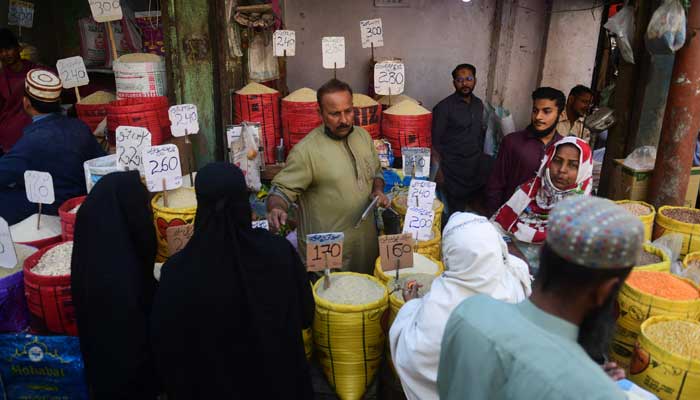Weekly inflation surges by 2.78pc
Consumers last saw SPI surge 42.7% year-on-year five months back when wheat flour prices reached all-time amid flooding
KARACHI: Pakistan’s weekly inflation remained stubbornly elevated at 2.78 percent week-on-week and 41.54 percent year-on-year during the seven-day period ended February 23, as government raised gas tariff to please the International Monetary Fund (IMF).
Pakistan Bureau of Statistics (PBS) data issued on Friday attributed the rise in the sensitive price indicator (SPI) inflation to WoW increase in prices of gas for Q1 (108.38 percent), cigarettes (76.45 percent), bananas (6.67 percent), chicken (5.27 percent), sugar (3.37 percent), cooking oil 5 litre (3.07 percent), vegetable ghee 2.5kg (2.79 percent), vegetable ghee 1kg (2.20 percent) and prepared tea (1.09 percent).
To get IMF approval for the $1.1 billion tranche out of the $6.5 billion bailout package under the extended fund facility, the government of Pakistan almost doubled the gas charges for up to 3.3719 MMBTU. Previously, the rate was Rs147.57, which now stands at Rs295.
Consumers last saw SPI surge 42.7 percent YoY during the week ended September 8, 2022 when wheat flour prices reached an all-time high on account of massive flooding across the country.
PBS attributed the YoY increase in SPI to the rise in prices of onions (372.03 percent), cigarettes (164.71 percent), gas charges for Q1 (108.38 percent), chicken (85.65 percent), diesel (81.36 percent), eggs (75.81 percent), rice irri-6/9 (75.41 percent), rice basmati broken (74.16 percent), bananas (72.22 percent), pulse moong (70.39 percent), petrol (69.87 percent), tea (62.76 percent), pulse gram (57.02 percent), bread (55.36 percent), pulse mash (53.90 percent) and LPG (52.59 percent).
However, it also noted a decrease in the prices of tomatoes (67.93 percent), chili powder (7.42 percent) and electricity charges for Q1 (6.64 percent).
The stubborn rise in SPI inflation was expected.
Analysts had said last week that inflationary pressures would intensify as the government has taken tax measures and made electricity, petroleum and gas price adjustments to unlock the IMF programme.
Consumers have been reeling under the burden of rising prices of essential kitchen items, particularly edibles.
As per PBS data, the average price of 1kg broiler chicken was Rs469.81 during the week under review compared to Rs446.29 last week. Up only Rs23.52/kg. However, consumers had something else to say.
A woman buying chicken from a shop in Karachi said, “They are selling chicken for gold now. I just bought half a kilo of chicken wings for Rs400.”
A kebab shop owner standing nearby said that it was becoming impossible to do business as boneless chicken was above Rs1,000/kg. “Like others, I should either reduce the quality of the kebabs or start charging higher. But if I increase the price, my sales will be hit as people are already cutting their expenses,” he added.
For the groups spending up to Rs17,732; Rs17,733-22,888; Rs22,889-29,517; Rs29,518-44,175; and above Rs44,175; WoW SPI increased 2.42, 2.86, 2.32, 2.18, and 3.10 percent respectively.
On the other hand, YoY SPI for the expenditure groups went up 37.81, 39.80, 40.95, 41.94, and 42.98 percent respectively.
For the week under review, SPI was recorded at 241.29 points against 234.77 points registered last week and 170.47 points recorded during the week ended February 24, 2022.
-
 Extreme Cold Warning Issued As Blizzard Hits Southern Ontario Including Toronto
Extreme Cold Warning Issued As Blizzard Hits Southern Ontario Including Toronto -
 Lana Del Rey Announces New Single Co-written With Husband Jeremy Dufrene
Lana Del Rey Announces New Single Co-written With Husband Jeremy Dufrene -
 Ukraine-Russia Talks Heat Up As Zelenskyy Warns Of US Pressure Before Elections
Ukraine-Russia Talks Heat Up As Zelenskyy Warns Of US Pressure Before Elections -
 Lil Nas X Spotted Buying Used Refrigerator After Backlash Over Nude Public Meltdown
Lil Nas X Spotted Buying Used Refrigerator After Backlash Over Nude Public Meltdown -
 Caleb McLaughlin Shares His Resume For This Major Role
Caleb McLaughlin Shares His Resume For This Major Role -
 King Charles Carries With ‘dignity’ As Andrew Lets Down
King Charles Carries With ‘dignity’ As Andrew Lets Down -
 Brooklyn Beckham Covers Up More Tattoos Linked To His Family Amid Rift
Brooklyn Beckham Covers Up More Tattoos Linked To His Family Amid Rift -
 Shamed Andrew Agreed To ‘go Quietly’ If King Protects Daughters
Shamed Andrew Agreed To ‘go Quietly’ If King Protects Daughters -
 Candace Cameron Bure Says She’s Supporting Lori Loughlin After Separation From Mossimo Giannulli
Candace Cameron Bure Says She’s Supporting Lori Loughlin After Separation From Mossimo Giannulli -
 Princess Beatrice, Eugenie Are ‘not Innocent’ In Epstein Drama
Princess Beatrice, Eugenie Are ‘not Innocent’ In Epstein Drama -
 Reese Witherspoon Goes 'boss' Mode On 'Legally Blonde' Prequel
Reese Witherspoon Goes 'boss' Mode On 'Legally Blonde' Prequel -
 Chris Hemsworth And Elsa Pataky Open Up About Raising Their Three Children In Australia
Chris Hemsworth And Elsa Pataky Open Up About Raising Their Three Children In Australia -
 Record Set Straight On King Charles’ Reason For Financially Supporting Andrew And Not Harry
Record Set Straight On King Charles’ Reason For Financially Supporting Andrew And Not Harry -
 Michael Douglas Breaks Silence On Jack Nicholson's Constant Teasing
Michael Douglas Breaks Silence On Jack Nicholson's Constant Teasing -
 How Prince Edward Was ‘bullied’ By Brother Andrew Mountbatten Windsor
How Prince Edward Was ‘bullied’ By Brother Andrew Mountbatten Windsor -
 'Kryptonite' Singer Brad Arnold Loses Battle With Cancer
'Kryptonite' Singer Brad Arnold Loses Battle With Cancer




